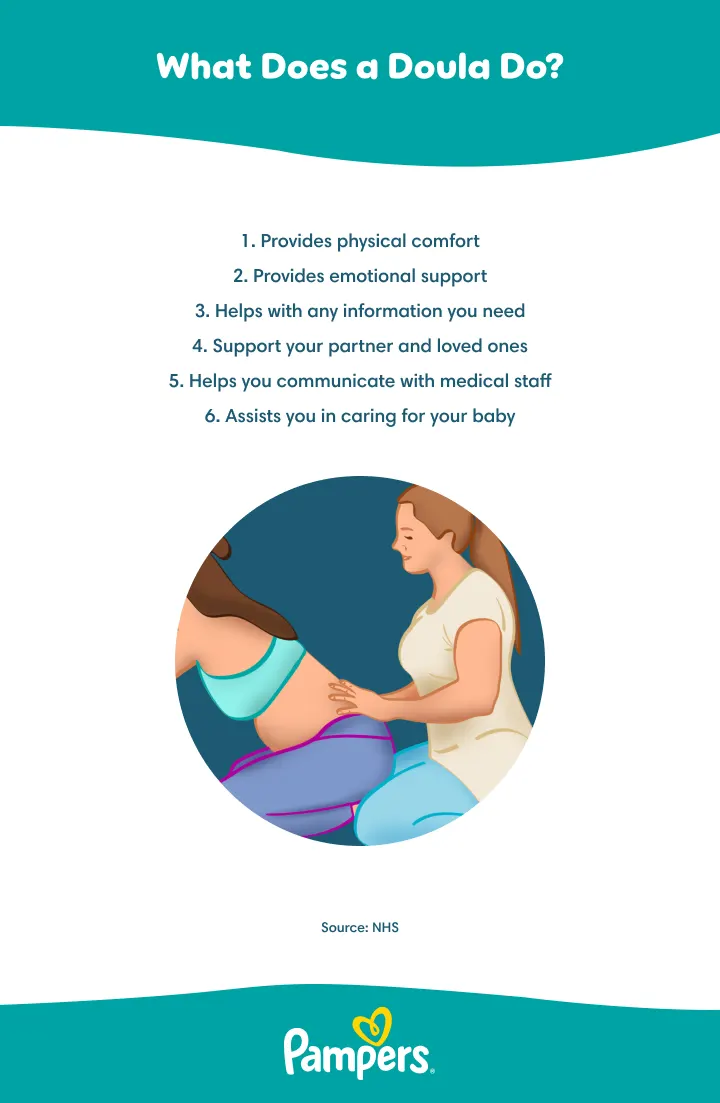What Is a Doula and Do You Need One?
It’s completely understandable to want extra physical and emotional support during labour and childbirth. Many expectant parents find comfort in hiring a skilled birthing coach, known as a doula, who can offer nurturing assistance before, during, and even after the baby arrives.
A doula isn’t a substitute for a midwife, but they can provide extra comfort and emotional support during labour and delivery.
Read on to learn more about what a doula is, what the benefits might be and questions to ask when hiring a doula in the UK.
What Is a Doula?
The meaning of the word ‘doula’ is derived from Greek, meaning ‘helper’ or ‘caregiver’, but it’s now used to describe a non-medical professional who provides emotional and physical support for pregnant people during the process of giving birth, and sometimes during pregnancy and in the postnatal period (after birth).
Keep in mind that a doula is not a trained medical professional and isn’t a substitute for your midwife or obstetrician.
What Is the Doula’s Role?
There are many ways in which a doula can offer care and support that your medical team may not provide. To understand a doula's role, it's important to recognise the different types of support they can offer.
A doula's assistance isn't limited to just labour and childbirth; they can offer advice during your pregnancy and provide postnatal care and guidance after birth.
Ultimately, it’s up to you to decide how and when to make the best use of your doula’s expertise.
These are some examples of the support doulas can provide:
Physical comfort during labour. A doula might help you with your breathing techniques, or give a comforting massage during labour, for example. Just having someone to lean on when getting around or changing positions can help you feel more comfortable.
Emotional support. Whether you need reassurance, comfort or encouragement, a doula can provide it. They’re also there to just listen if that’s what you need.
Information. A doula’s experience may come in handy when you want to know more about what happens when giving birth, or about methods of pain relief such as epidural anaesthetics, as well as what is to be anticipated in the postnatal period.
Communication. Your doula can serve as a liaison between you, your family and medical professionals. It might also be reassuring to have someone by your side who can help explain your birth preferences to your doctor and midwife, ask questions and relay the answers to help you understand what’s going on if any unexpected procedures become necessary.
Help with feeding your baby. If you’ve chosen to breastfeed your baby, a doula may be able to help you navigate the challenges of breastfeeding, such as how to find comfortable breastfeeding positions. A doula can also answer your questions if you choose to formula-feed your baby. For example, when and how much to feed your baby.
Assistance with caring for your baby. If you’d like, a doula could also help you get to grips with some of the new skills you’ll soon be learning, like changing a nappy, giving your baby their first bath or caring for your baby’s umbilical cord stump.
Potential Benefits of Having a Doula
Some studies show that the emotional support of a doula may result in a more positive labour and postnatal experience for some pregnant people. For example:
Shorter labour duration can occur with a doula’s continuous presence, providing reassurance, comfort and advocacy, which may positively influence labour progression
Reduced likelihood of requiring pain relief medication during labour
Lower rates of caesarean sections or assisted delivery for those who opted for a unmedicated vaginal delivery
Decreased anxiety and/or postnatal depression. This may be due to the continuous physical and emotional support of a doula, and the female-centred communication that can occur between the pregnant person and the doula
Enhanced communication between the healthcare team and parents
More positive experiences for parents following delivery.
It’s important to remember that hiring a doula is not a requirement, and some individuals prefer to give birth without one. If you are uncertain about whether to use a doula, consider discussing it with your GP or midwife. They can provide valuable insights on whether a doula might be a good fit for you. Ultimately, the decision is yours to make
How Long Does a Doula Stay After Birth?
If you hire a postnatal doula, it’s typical for them to help you in the first few weeks or months after the birth of your baby; however, some parents even hire them for longer. The length of time depends on your needs and preferences, so discussing this with your doula is a good idea. You can also reach out to them in the postnatal period if you realise you need more help than you initially thought.
Doula Vs. Midwife: What’s the Difference?
When considering the difference between a doula and a midwife, it's important to understand that they serve distinct roles rather than being interchangeable. A doula provides emotional and physical support during pregnancy, labour and postnatal, while a midwife generally focuses on the medical aspects of childbirth and antenatal care. A midwife is a specially trained and licensed professional who works closely with your doctor to directly assist you during your pregnancy, labour and delivery. If your pregnancy and labour are straightforward, a midwife will likely deliver your baby, whilst a doula will be there to provide support and comfort, such as helping you with breathing techniques. If there are complications in your pregnancy or labour, a doctor will be involved in performing your delivery. Unlike a doula, a midwife is able to provide you with medical advice and examinations.
Is a Doula Right for You?
Deciding whether to hire a doula depends on the type of support and birth experience you desire. Whether you need a doula varies based on your personal circumstances and preferences. A doula may be especially beneficial for first-time parents, individuals from underrepresented groups, those who have experienced trauma in previous births, or anyone looking for unmedicated labour.
You might also need to consider the cost of a doula, as this may vary depending on location, experience, services provided and what organisation they work for. It’s a good idea to contact various doulas and ‘shop around’ before making a decision. You can also talk to your GP or midwife and find out what they recommend. Some organisations offer doula services at reduced costs or even for free, particularly to those in high-need populations.
While a doula is not a medical necessity, you may find the support invaluable for achieving a positive childbirth experience.
Hiring a Doula
You may be able to engage a doula privately on a fee-paying basis or find one offering their services as part of a volunteer doula scheme.
If you’ve decided a doula may be a good option for you, think about when you’d like to start working with one and start researching and interviewing potential doulas early so you have plenty of time to find the right one.
Your midwife may be able to give you advice on choosing a doula and point you in the direction of practising doulas or trusted doula organisations and agencies in your local area. You can also try searching online ‘doulas near me’ for local options.
It could be worth asking the other pregnant people you meet at birthing classes for word-of-mouth recommendations.
If you’ve found a doula who’s a good fit for you, it’s helpful if you, your midwife and your doula meet up and talk about how you can all work together to help support you during pregnancy, delivery and even after birth.
If you’re drawing up a birth plan, you might want to add your chosen doula’s contact information, as well as an outline of their role during your labour and delivery.
Don’t forget to discuss this plan and share a copy of it with your doula as well.
What to Ask Before Hiring a Doula
The key is to choose a doula you feel comfortable with. Once you’ve found a few options, it’s worth having a discussion with each of them.
You might consider asking the potential doula about:
their training, skills and experience
how many births they have attended
their philosophy when it comes to labour and childbirth
how they feel about your labour and birthing preferences
what they typically do for people during labour and delivery
what various other services they may provide
their fees and any other costs.
When meeting with a doula, it’s also a good idea to discuss any concerns you may have about your pregnancy and labour, and ask any other questions you may have.
And, of course, you should see how you feel around the doula — after all, you two will be working closely together at a very important personal time.
FAQS AT A GLANCE
A doula offers emotional and physical support before, during and after labour and childbirth. Additionally, a doula provides information and guidance and can act as a liaison between you and medical professionals.
The Bottom Line
Whether or not you decide to have a doula during your pregnancy is a personal choice, and only you can know what would make you feel most comfortable. Although having a doula is useful for some pregnant people or new parents, it’s not for everyone.
The goal is for you to feel as empowered and as relaxed as possible during pregnancy, labour, childbirth and beyond. Keep that in mind and you’ll be sure to make the right decision.
Whether you decide to have a doula or not, Pampers is here with advice and tips for your pregnancy and parenting journey. Plus, by downloading the Pampers Club App, you can save and earn exclusive rewards with each Pampers purchase you make.
How We Wrote This Article The information in this article is based on expert advice found in trusted medical and government sources, such as the National Health Service (NHS). You can find a full list of sources used for this article below. The content on this page should not replace professional medical advice. Always consult medical professionals for full diagnosis and treatment.
Join Pampers Club and get:






